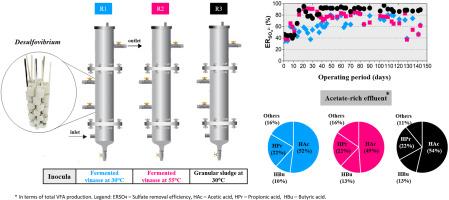充分发挥甘蔗生物炼油厂中蔗渣发酵的潜力
IF 16.3
1区 工程技术
Q1 ENERGY & FUELS
引用次数: 0
摘要
由于微生物竞争和硫化物毒性,甘蔗渣中的高浓度硫酸盐(2.0 g L-1)给单相厌氧消化(AD)系统带来了挑战。虽然两相厌氧消化(AD)系统在嗜热发酵系统中成功地减少了硫酸盐,但在中嗜热条件下取得类似的成功仍未见记载。本研究评估了在中嗜热条件下的高速发酵反应器中建立和维持长期稳定的硫化物生成活性的不同策略。对三个反应器进行了测试,每个反应器的接种方式不同:R1 接种的是嗜中性的天然发酵葡萄渣,R2 接种的是嗜热性的天然发酵葡萄渣,R3 接种的是颗粒污泥。所有反应器均在 30 °C 温度下运行,水力停留时间为 12 小时。在接种过程中添加 0.25 gNaHCO3 g-1CODt 能有效地将 pH 值维持在 6.5 以上,从而刺激所有系统的硫化物生成活性,而不受硫酸盐负荷率变化(3.9-4.8 kgSO4 m-3 d-1)的影响。R3 显示出卓越的缓冲能力和强大的硫化物生成能力,在 R1、R2 和 R3 中,硫酸盐去除率分别为 63 ± 14 %、72 ± 15 % 和 83 ± 16 %,主要由脱硫弧菌驱动。所有反应器中都存在养氢型产甲烷现象,R1 由 Methanofollis、Methanobacterium 和 Methanosarcina 驱动,R2 由 Methanofollis 驱动,R3 由 Methanoculleus 驱动。尽管发生了甲烷生成,但 R3 表现出较高的醋酸盐积累(3.5 gHAc L-1),在两阶段厌氧消化(AD)方案中具有促进醋酸菌甲烷生成的巨大潜力。产生的沼气中氢含量较低(1%),但硫化物含量丰富(高达 9%),因此有必要对沼气进行进一步处理。这些发现揭示了硫酸盐还原菌和甲烷菌对高有机负荷的高度适应性,突出了沼渣厌氧消化的复杂性。本文章由计算机程序翻译,如有差异,请以英文原文为准。

Unleashing the full potential of vinasse fermentation in sugarcane biorefineries
High sulfate concentrations (>2.0 g L−1) in sugarcane vinasse present challenges for single-phase anaerobic digestion (AD) systems due to microbial competition and sulfide toxicity. While two-phase AD systems have successfully reduced sulfate in thermophilic fermentative systems, similar success under mesophilic conditions remains undocumented. This study evaluated different strategies to establish and maintain stable long-term sulfidogenic activity in high-rate fermentative reactors under mesophilic conditions. Three reactors were tested, each inoculated differently: R1 with mesophilic naturally-fermented vinasse, R2 with thermophilic naturally-fermented vinasse, and R3 with granular sludge. All reactors were operated at 30 °C with a 12-h hydraulic retention time. The addition of 0.25 gNaHCO3 g−1CODt during inoculation effectively maintained pH levels higher than 6.5, stimulating sulfidogenic activity in all systems, regardless of sulfate loading rate variations (3.9–4.8 kgSO4 m−3 d−1). R3 demonstrated superior buffering capacity and robust sulfidogenesis, achieving sulfate removal efficiencies of 63 ± 14 % in R1, 72 ± 15 % in R2, and 83 ± 16 % in R3, primarily driven by Desulfovibrio. Hydrogenotrophic methanogenesis persisted in all reactors, driven by Methanofollis, Methanobacterium, and Methanosarcina in R1, Methanofollis in R2, and Methanoculleus in R3. Despite methanogenesis occurrence, R3 exhibited higher acetate accumulation (>3.5 gHAc L−1), with great potential to boost acetoclastic methanogenesis in a two-stage AD scheme. The produced biogas was low in hydrogen (<1 %) but rich in sulfide (up to 9 %), necessitating further gas treatment. These findings reveal the high resilience of sulfate-reducing bacteria and methanogens to high organic loads, highlighting the complexity of AD of vinasse.
求助全文
通过发布文献求助,成功后即可免费获取论文全文。
去求助
来源期刊

Renewable and Sustainable Energy Reviews
工程技术-能源与燃料
CiteScore
31.20
自引率
5.70%
发文量
1055
审稿时长
62 days
期刊介绍:
The mission of Renewable and Sustainable Energy Reviews is to disseminate the most compelling and pertinent critical insights in renewable and sustainable energy, fostering collaboration among the research community, private sector, and policy and decision makers. The journal aims to exchange challenges, solutions, innovative concepts, and technologies, contributing to sustainable development, the transition to a low-carbon future, and the attainment of emissions targets outlined by the United Nations Framework Convention on Climate Change.
Renewable and Sustainable Energy Reviews publishes a diverse range of content, including review papers, original research, case studies, and analyses of new technologies, all featuring a substantial review component such as critique, comparison, or analysis. Introducing a distinctive paper type, Expert Insights, the journal presents commissioned mini-reviews authored by field leaders, addressing topics of significant interest. Case studies undergo consideration only if they showcase the work's applicability to other regions or contribute valuable insights to the broader field of renewable and sustainable energy. Notably, a bibliographic or literature review lacking critical analysis is deemed unsuitable for publication.
 求助内容:
求助内容: 应助结果提醒方式:
应助结果提醒方式:


